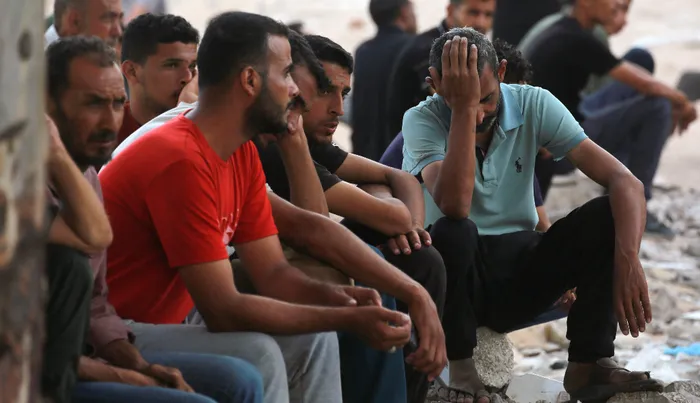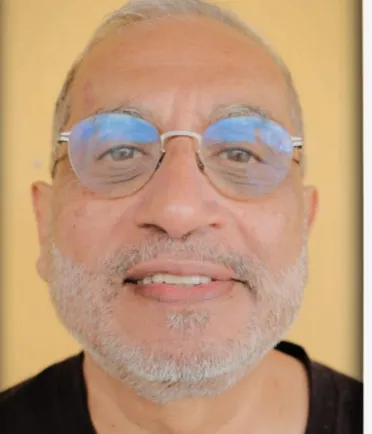
Palestinians mourn outside the Al-Shifa Hospital in Gaza City, where people were killed a day earlier while waiting for aid.
Image: Bashar TALEB / AFP
REPORTS coming from Gaza, which Israel has turned into a concentration camp, reminiscent of the hideous Nazi era, are devastating and heartbreaking. Israel is starving Palestinians to death. Over 150 Palestinians, including 89 children, have died of famine in recent days, as nearly two million people remain on the brink of death from starvation due to the ongoing blockade, siege and genocidal policies enacted by the Israeli state.
That is apart from daily tallies of around a hundred killed by the IDF in the queues for food at Israel’s infamous, inhuman and sadistically named “designated humanitarian corridors”, with a similar number killed during airstrikes. This is not merely a humanitarian crisis; it is systemic eradication of people in Gaza which Israel has turned into a kosher human abattoir, luring a starving population into human pens, trapping them, and then shooting them.
Israel is writing one of the darkest chapters in human history. We belong to an era where we were taught that Nazism is the greatest evil and so it was. Today starving children to death, shooting them for sport, shielded by democracies and dictators alike is the new abyss of cruelty. Today comparisons between Israel, Zionism and the Nazis are commonplace. When John Mearsheimer, the Professor of Political Science at the University of Chicago, was interviewed by Katie Halper, he confessed that the more time goes by... the Israelis look like the Nazis, their rhetoric, their behaviour is truly appalling.
The self-styled Jewish State is behaving like the Nazis did. Despite this, some Western states like the United Kingdom and France have only now, nearly two years into this current genocide, begun to express tentative support for Palestinian statehood. Their calls for recognition, delayed and conditional, ring hollow in the face of the relentless suffering on the ground.
What makes this delay even more grotesque is the violent silencing of their own citizenry who powerfully voice solidarity with Palestine. In the UK and France, thousands of ordinary people marched in support of Palestinian rights and protested Israeli war crimes, only to face police brutality and suppression. Yet, months later, the same governments now cautiously speak about recognition of a Palestinian state, framing it as a diplomatic maneuver rather than a moral imperative and speak of a two-state solution.
At the same time, they and most mainstream, corporate media of the Global North and even South Africa ignore the rejection by a majority of Palestinian and pro-Palestinian supporters globally, of the two-state Bantustan solution, believing that partition and ethnic exclusivity have perpetuated injustice and inequality. They call for a single, democratic state offering equal citizenship and guaranteeing equal rights to all inhabitants between the river and the sea, regardless of ethnicity or religion.
A two-state framework will not deliver justice, self-determination, or peace. Only a decolonised, inclusive democracy can provide genuine security and rights for all. The struggle for a free Palestine is not just for statehood. It includes the realisation of their inalienable right to self-determination, dignity, equality and full civil rights of all people living under despotic Israeli rule together with the right of return of the refugees with partitions. It seeks to transcend divisions imposed by occupation and apartheid-like systems.
In order to achieve this the settler colonial colony in Palestine, miscalled Israel, and the racist Zionist ideology fueling it needs to be eradicated. This sentiment is reflected in civil society and grassroots campaigns, which frame Palestinian liberation as part of a larger project of decolonisation and anti-racism, demanding a future built on coexistence and justice for all.
In South Africa, the situation is painfully contradictory. The official alignment with the Palestinian cause is evident in government statements and diplomatic actions. And the streets amplify this story. The recent Block the Boat Campaign stopping a ship suspected of carrying military cargo to Israel is a case in point. Protests in support of Palestinians continue to erupt across the country, reflecting deep public outrage and a refusal to accept genocide silently. However, opposition exists within the country as well.
White nationalist groups and political parties like the Democratic Alliance and the Patriotic Alliance openly support Zionism, effectively siding with the perpetuators of Palestinian suffering. The international community’s laggard response is exemplified by the hesitant stances of these Western governments.
The British Prime Minister, Keir Starmer, announced that the UK would recognise a Palestinian state at the United Nations General Assembly in September 2025, if Israel did not take substantive steps: agreeing to a ceasefire in Gaza, halting settlement expansion in the West Bank, and committing to a genuine peace process based on a two-state solution. France has pledged unconditional recognition alongside this move. Saudi Arabia, Jordan, and some Arab League states have expressed guarded support. Yet the reality remains unchanged on the ground - starvation and murder of innocent Palestinian civilians persist.
This conditional recognition is a diplomatic signal rather than a genuine step toward justice. It risks becoming an exercise in optics, allowing Western powers to claim moral high ground without committing to sanctions or tangible actions that would hold Israel accountable for war crimes, human rights abuses, and crimes against humanity documented extensively by credible organisations such as B’Tselem, Amnesty International, and Human Rights Watch.
These entities, alongside the United Nations, consistently report systematic evidence of genocide and collective punishment against Palestinians. These reports were even detailed in South Africa’s submissions to the International Court of Justice. Palestinian civil society and journalists like Ali Abunimah, who will soon be visiting South Africa, warn against falling for the so-called “two-state solution” narrative, which, in their view, is a continuation of the Zionist settler-colonial project aimed at erasing Palestinian existence under the guise of peace.
Abunimah has termed the “Palestinian state” project one that ultimately serves to legitimise the ongoing genocide, stressing that the international community must not be deceived by diplomatic facades that ignore Palestinians’ right to justice, return and dignity.
In this context, South Africa's failure to impose consequences for nationals who return from fighting with the IDF in contravention of the Regulation on Foreign Military Assistance Act, is not just a legal omission; it is a profound ethical failing. South Africa, with its own history of apartheid and liberation struggle, must stand firmly and consistently against any form of systemic racial oppression and genocide worldwide. The apartheid analogy between the Palestinian experience and South African history remains compelling and ought to galvanise both government and civil society actions.
South Africans continue to take to the streets, demanding accountability and justice. Yet every day, the silence and inaction from parts of the political spectrum embolden those who promote Zionism and undermine the Palestinian cause. The inability to uphold the Genocide Convention within South Africa undermines its moral leadership in global human rights dialogues. The wider Global South, however, has spoken unequivocally against the genocide in Gaza, condemning the depravity of acts that destroy civilian life, displace millions and inflict mass starvation.
South Africa, a leading voice in the Global South and African Union, must translate this condemnation into concrete policies and diplomatic pressure that go beyond mere statements. Recognition of Palestine is not simply symbolic. It must be a key step in reversing the ongoing erasure of an indigenous people. But recognition alone, especially if conditional or delayed, cannot stem the violence or alleviate the suffering of millions.
There must be international enforcement mechanisms, sanctions and a global commitment to accountability for those committing war crimes and genocide. Recognition of a Palestinian State does not absolve countries from taking actionable steps to prevent Israel committing a genocide and punishing it with sanctions, issuance of no-fly zones, intervention to halt the Israeli military occupation, and the provision of massive unrestricted.
As the UK and France prepare these diplomatic signals, and as South Africa grapples with internal contradictions and political pressures, the voices from Gaza grow weaker under siege, and the famine deeper. The international community faces a crucial test: will it act decisively to stop the ongoing genocide and uphold international law, or will it continue to enable a travesty of justice disguised as peace negotiations?
The legacy of the Holocaust and past genocides demands vigilance and action today. The Palestinian Solidarity Campaign (PSC) calls for truthful remembrance and immediate solidarity with those facing annihilation now. History will judge those who stood silently and those who acted with resolve.

Usuf Chikte
Image: File
Usuf Chikte is a Palestine Solidarity Campaign co-ordinator.
** The views expressed do not necessarily reflect the views of IOL or Independent Media.
Related Topics: